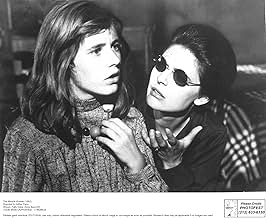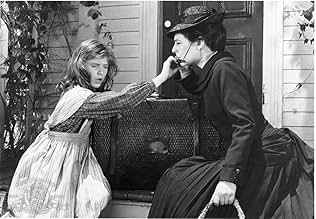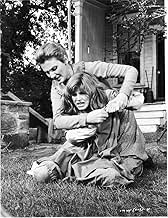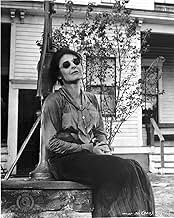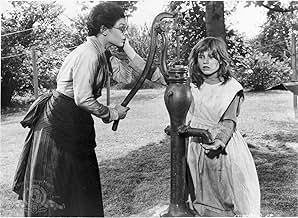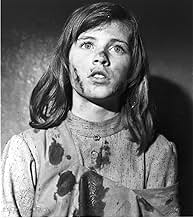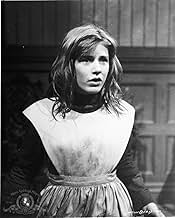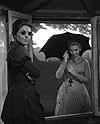Helen è una bambina cieca e sordomuta che, all'età di 10 anni, viene affidata dai genitori alle cure di Anna, un'insegnante che adotta metodi inconsueti per aiutare la piccola a comunicare c... Leggi tuttoHelen è una bambina cieca e sordomuta che, all'età di 10 anni, viene affidata dai genitori alle cure di Anna, un'insegnante che adotta metodi inconsueti per aiutare la piccola a comunicare con l'esterno.Helen è una bambina cieca e sordomuta che, all'età di 10 anni, viene affidata dai genitori alle cure di Anna, un'insegnante che adotta metodi inconsueti per aiutare la piccola a comunicare con l'esterno.
- Vincitore di 2 Oscar
- 12 vittorie e 13 candidature totali
- Undetermined Role
- (non citato nei titoli originali)
- Martha at Age 10
- (non citato nei titoli originali)
- Admissions Officer
- (non citato nei titoli originali)
- Doctor
- (non citato nei titoli originali)
- Percy at Age 10
- (non citato nei titoli originali)
- Annie at Age 10
- (non citato nei titoli originali)
- 2nd Crone
- (non citato nei titoli originali)
- Mr. Anagnos of Perkins School in Boston
- (non citato nei titoli originali)
- Jimmie at Age 8
- (non citato nei titoli originali)
- 1st Crone
- (non citato nei titoli originali)
- 3rd Crone
- (non citato nei titoli originali)
- Viney - Keller Maid
- (non citato nei titoli originali)
Trama
Lo sapevi?
- QuizMark Twain was the first person to refer to Anne Sullivan as "the miracle worker". Twain was a friend of Helen Keller.
- BlooperAnnie Sullivan has to look up the word discipline in a dictionary later in the film even though she's used it in a letter near the beginning; however, she remarks that she must know how to spell it before teaching it to Helen, and may have simply used her best guess in the letter since nothing was at stake.
- Citazioni
Annie Sullivan: I have to live with her somewhere else.
Kate Keller: For how long?
Annie Sullivan: Until she learns to listen to and depend on me.
Captain Arthur Keller: Miss Sullivan...
Annie Sullivan: Captain Keller, it meets both of your conditions. It's the one way I can get back in touch with Helen, and I don't see how I can be rude to you again if you're not around to interfere with me.
Captain Arthur Keller: And what's your plan if I say no? Pack the other half for home and abandon your charge to... to...
Annie Sullivan: The asylum? I grew up in such an asylum, the State Alms House. Rats? Why, my brother Jimmy and I used to play with the rats because we didn't have any toys. Maybe you'd like to know what Helen will find there, not on visiting days. One ward was full of the old women. Crippled, blind, most of them dying, but even if what they had was catching, there was nowhere else to move them. That's where they put us. Then there were younger ones across the hall, prostitutes mostly, with TB and epileptic fits. And some of the kind that keep after other girls, especially the young ones. And some were just insane. Some had the DTs. Then there were girls in another ward to have babies they didn't want. They started at thirteen, fourteen. They left afterwards, but the babies stayed. We played with them, too. There were a lot of them, with sores all over from diseases you're not supposed to talk about.
- ConnessioniEdited into Histoire(s) du cinéma: Le contrôle de l'univers (1999)
- Colonne sonoreHush, Little Baby
(uncredited)
Traditional Southern lullaby
Music adapted by Don Costa
Lyrics by Arthur Siegel
Sung by Anne Bancroft
Also played in the score
The film, based on the play by William Gibson, is an extremely well-acted film, brilliantly opened up on the big screen. Anne Bancroft as teacher Annie Sullivan and Patty Duke as young Helen Keller are outstanding. Sullivan's determination to communicate to the deaf and blind Helen made for a compelling story on stage as well as on screen.
I understand that when Hollywood wanted to make this movie, the powers-that-be did not want Bancroft or Duke. After finally seeing the movie, I'm glad that director Arthur Penn and producer Fred Coe chose to make this movie outside the so-called Hollywood establishment.
One scene that was discussed in some other posts was the dining room in which Sullivan forces Helen to eat food from a spoon and not her hands. It almost felt like I was watching a fierce wrestling match. It was a physical, as well as an emotionally draining, sequence. A battle of wills between teacher and the unwilling student. It was brilliantly edited and directed.
The film was not without faults. According to the IMDb, a number of flashback scenes were filmed in their entirety but did not work out very well. Those scenes were incorporated within the movie and it looked rather clumsy. The scenes could have been easily edited out completely.
As with all plays adapted to the big screen, some scenes were a little bit stagy. But that involved just a few scenes and, overall, it did not ruin the movie.
What I really liked about the movie was that the filmmakers were very successful at not succumbing to sentiment. This movie could have easily been very corny and sappy. Perhaps Bancroft and Duke and their performances had something to do with that.
I've been a fan of Anne Bancroft for many years and I'm very glad that I had the chance to see her well-deserved Oscar-winning performance.
RIP Ms. Bancroft.
I più visti
Dettagli
Botteghino
- Budget
- 500.000 USD (previsto)
- Lordo in tutto il mondo
- 4.139 USD
- Tempo di esecuzione1 ora 46 minuti
- Colore
- Mix di suoni
- Proporzioni
- 1.85 : 1
Contribuisci a questa pagina




